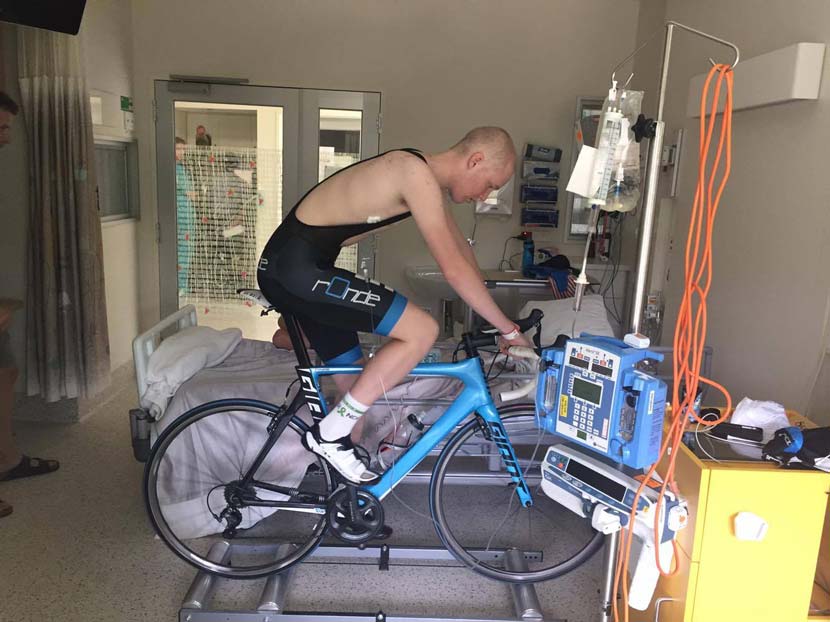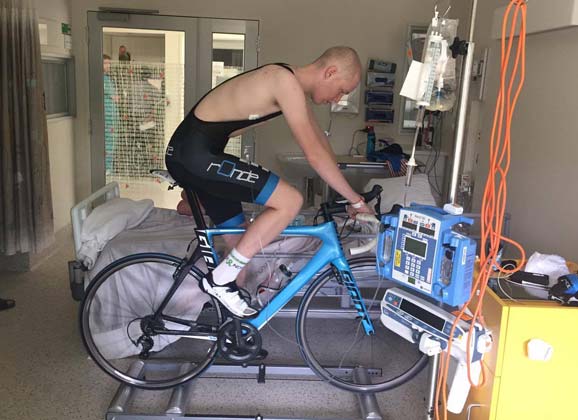In October 2015, Zack Gilmore felt a lump behind his ear after a heavy training session on the bike. The 16-year-old went to the doctors to find out what it was and, three days later, was given the dreadful news: “It’s cancer.”
The son of Matthew Gilmore, the former world champion and Olympic medallist, began chemotherapy soon after being diagnosed with lymphoma.
Here is a quick interview with a young man coping with an illness… and dreaming of riding his bike again.

RIDE: I’m talking with Zack Gilmore and he’s in the middle of a treatment for lymphoma and he’s just told me he’s getting some platelets put in while we’re talking. Can you explain to me what’s going on?
Zack Gilmore: “Right now or do you mean in general?”
First of all, right now… and then in general.
“At the moment I’m just having some platelets put in which is white blood cells –they help to clot blood; if I don’t have any platelets it means, if I was to get an injury or something, I would just bleed out.”
But that, I can imagine, is not quite as traumatic as the chemo treatment. Is that right?
“Yeah, the chemo treatment has all different side effects but they’re not too bad – I’ve kind of gotten used to having the chemo in.”
Currently you’re just sitting there with a drip, is that right?
“Yeah, that’s it.”
Do you feel like you’re closing in on the end of this treatment or is it still a long way to go?
“Oh, I think at the moment I’ve still got another six months of intense treatment and then I’ll have another year and a half of just maintenance – taking tablets when I’m at home.”
I would say, for a 16-year-old, you’ve become a bit of a medical expert. Is that right?
“Yeah, I’ve learnt a fair bit. It’d be good to have an exam on all this stuff afterwards – I think I’d nail that one.”
Can you talk me through, with regard to the chemo – I know you started that around November – how you cope as a young man with pretty invasive injections?
“To start off with it was all a bit confusing. I didn’t really know what was happening and I think just having such great family support really helped.
“Mentally, I went in thinking that I was pretty fit.
“I won a national medal a few weeks before I was diagnosed so I went in with my head held high.”
Your father told me when you first started the treatment that he was a very anxious person in the hospital and that you just looked at him one time and said, ‘Look Dad, I’ve got cancer. Let’s just get through it.’ Do you recall that exchange?
“I don’t really remember it because there’s been a lot of other things happening.
“I’ve had a few chats with dad before and I know he’s been a bit nervous about all this – and so have I – but I think just being a family gets you through this sort of battle a lot easier.”
Can you explain the changes in your body since the diagnosis?
“Yep. So I’ve lost my hair, which is the one side effect that most chemo patients have, but the big one is that I’ve found has changed me is that I’ve lost a lot of muscle in my legs.
“I get pains every now and then in my stomach.”
And are you losing a lot of weight? What were you when you started all of this and what are you currently at?
“I think I came in at about 72kg and at the moment I’m 71. To start off with, when I first came in to hospital, I went down to about 65kg and then I was put on a certain drug to help fight the cancer off and that caused me to eat a lot of food so I went up to 75. I’ve just been up and down really.
“I’ve seen my body transform and it’s pretty interesting to see what our bodies can do.”
Your dad sent me the photo which I think is becoming quite famous of you on the rollers next to your hospital bed.
“That was because the doctor told me that I should try and get up and about just to move my legs a bit because I was in the midst of having chemo and also had a bit of an infection.
“I was in hospital for a while and my legs were quite sore and I dealt with that the best way that I knew of which was just to roll them out on the bike.”
And how were your sensations after that session on the rollers?
“Well, I didn’t last too long so it didn’t help too much but mentally it was one of the best things for me.”
People use cycling for a lot of different things and I don’t know if winning races really matters all that much when you put it into perspective. What have you gotten out of this whole experience? Do you think after you get through this, you’ll get back on the bike?
“Definitely! Coming into having all this and knowing that I’ve got my bike there helps.
“I’m just used to going onto my bike to think about things.
“I just want to get back to that freedom of being able to think.”
I’d imagine, just based on the Gilmore family history, that you would have been tempted to chase a career as a cyclist. Do you now want to be a doctor?
“Nah, I don’t really want to be a doctor. I’m still hoping to be a cyclist when I get out of here. I’d like to try and do some of the things that dad and my grandfather did.”
How do you anticipate going about that? Will it be getting through this treatment and getting on the track? Going on the road? What floats your boat? What gets you through the darker moments?
“It’s a hard to think about; what gets me through it? I don’t know. I’ve never really thought about the other options – I’ve only ever thought, ‘Oh yeah, I’ll be out of here and riding my bike soon.’
“I’ve never really thought about the dark side of it all which impresses some of the other people. I’ve just always been happy and try to think about getting back out on the bike.”
– Interview by Rob Arnold



